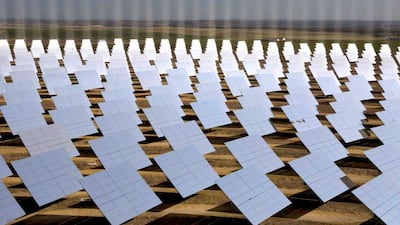The ?395 billion (Dh2.06 trillion) scheme is so massive in scale it could be the stuff of science fiction: huge solar power plants across the Sahara sprouting power cables that supply a fifth of Europe's electricity by 2050. The concept's backers, a group of German utility companies that signed an agreement last week, say it is technologically feasible and would reduce Europe's carbon emissions while diversifying its sources of energy imports.
The Desertec plan, as it is known, has the potential to reshape the energy landscape of the Middle East as the world shifts from oil to renewables, experts say. It would generate annual revenues from electricity sales of US$90 billion (Dh330.3bn) for Middle East economies, just as oil production is forecast to decline, AT Kearny, the management consultancy, has calculated. "There's nothing comparable to this," said Christian von Tschirschky, a principal at the firm. "This is a real switch in the overall understanding of what is energy and where does energy come from."
Extensions in electricity links could also allow Gulf countries to export solar-generated power into the project, he said. But Desertec will remain little more than a fantasy unless backers can resolve important questions of cost and political stability. The project's price tag would equal ?395bn over 40 years, comparable in size to the investments that built the modern oil industry. Transmission links and submarine cables to transport the energy would alone cost ?45bn.
The German firms, led by Siemens, Munich Re, RWE, E.On and Deutsche Bank, among others, committed to develop a financial model for the project with the signing of an agreement in Munich last week, but the rough concept has already emerged. Companies and governments in Europe would fund the grid and some of the power plants and offer guarantees to buy the electricity at profitable levels. Companies and governments in Arab countries would invest in power plants to receive guaranteed returns at the pre-arranged prices.
Assuming European countries can find the money - no easy feat in the current financial environment - they will also need to receive better guarantees from Arab governments that their investments will be safe over a century of operation. The proposal comes at a time when European confidence in North Africa as a source of energy is already growing. Algeria and Morocco export electricity to Spain, and Algeria has become a leading gas supplier.
Earlier this month, Algeria, Niger and Nigeria signed an agreement to build a cross-continent gas pipeline to bring Nigerian gas to Europe. But with a project of this scale, experts say North African countries will need to do more to assuage European investors. Some key players in the scheme have a mixed record for foreign investors: Algeria still grapples with an insurgency and fears over its political stability, while Libya, which recently opened its oil sector to western companies, has threatened to re-nationalise energy assets.
Both countries have recently seen an increase in official rhetoric against foreign investment, but such opposition has so far failed to have any direct impact on the business environment, said Sara Hassan, a North Africa analyst at IHS Global Insight. "It should be seen in the context," Ms Hassan said. "Generally both countries are open to large, lucrative business deals." Some in the European power industry have said the scheme could create new doubts about the security of energy supplies. The chief executive of Vattenfall, a Swedish power company, has said Desertec would maintain Europe's reliance on imported energy when it should be trying to develop more dependable domestic sources.
The Desertec Foundation predicts that by 2050, 65 per cent of European energy will come from domestic renewables, 17 per cent will be imported from North Africa, and 18 per cent will still come from fossil fuels. To get around any difficult political challenges, the initial development stages could target other Middle Eastern countries that have proved more stable and predictable, such as the Gulf countries, Mr von Tschirschky said.
Political questions aside, Europeans have turned to the Middle East and North Africa to generate their power simply because it is the ideal setting for solar energy installations. Desertec would principally rely on solar thermal plants, large-scale installations of mirrors and lenses that focus sunlight to produce steam, which then powers a conventional generator. The technology, which is well established in the US and Spain, has important advantages over solar photovoltaic panels, which generate electricity directly from sunlight. Solar thermal is generally cheaper and can be paired with fossil fuels to maintain a steady output of electricity regardless of clouds or dust. Plants can be equipped with technology to store heat so power production continues well after the sun sets.
Masdar, the Abu Dhabi government-owned energy firm, is building a 100 megawatt solar thermal plant in Al Gharbia, with plans to build several more. The Desertec Foundation estimates it would cost between 10 US cents and 20 cents a kilowatt-hour to generate solar thermal power in North Africa and transport it to Europe through high-voltage transmission lines. Those estimates are far higher than average costs for energy generated by coal and other conventional sources, creating a need for a subsidy supplied by Europe. But the foundation says Desertec's electricity will eventually become competitive without subsidies as costs fall with greater economies of scale, and conventional energy becomes more expensive as power firms are forced to pay for their carbon emissions.
Ultimately, Middle Eastern countries could come to see the construction of solar plants as a way to bolster their own energy security, Mr von Tschirschky said. There is a high imbalance between supply and demand at different parts of the year in the Middle East, he said. "They can use these plants for their own consumption during the peak months, and they can sell the energy during all the other months. They can use this right away."
cstanton@thenational.ae

